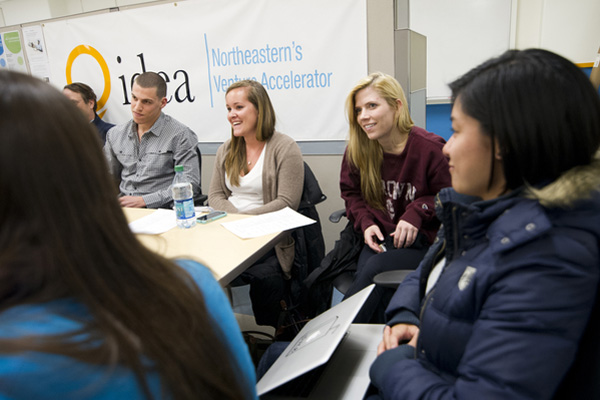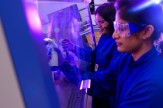Students drive entrepreneurial spirit at Northeastern

You have to meet a lot of qualifications to be the CEO of IDEA, Northeastern’s student-run venture accelerator. But there’s just one thing you can’t have: A college degree—at least not yet.
In fact, IDEA, which is housed within the Center for Entrepreneurship Education, is entirely student-run. Everyone on the management team is a college student, from new CEO Max Kaye to social media manager Nina Stepanov. And the model is working; new student, faculty, and alumni ventures represent every college at the university.
“We have a laboratory here that attracts Northeastern’s brightest minds,” said Kaye, a fifth-year finance major in the D’Amore-McKim School of Business. “These students talking to and working with each other, that’s what brings about the success you see in business after business.”
The decision to staff IDEA with students was deliberate. They hold the organization’s key leadership positions and decide what ventures will receive funding. Faculty members serve exclusively in an advisory role.
“We’re providing them with a safe environment to fail,” said Dan Gregory, IDEA’s faculty adviser. “And when they’re free to fail, that’s when our students can really succeed. Of course we want our students to succeed, but failure sparks new ideas and new potential, creating opportunities these entrepreneurs may never have even imagined before.”
This student-centric philosophy has guided IDEA since its inception almost four years ago, when a small group of Northeastern business students sought backing and support from university administrators. The group, the students proposed, would coach startups and distribute cash to help promising ones advance. University officials, especially then-dean Thomas Moore, were eager to support their ambitious proposal, quickly appropriating the funds to get the organization up and running.
Since 2009, IDEA has shepherded more than 350 business concepts, with 170 active ventures, and handed out nearly $400,000 in grants. Ventures are eager to participate, benefiting from enthusiastic student leaders and an entrepreneur-first model that doesn’t stake an equity claim in the businesses it supports. IDEA ventures have become mainstays in competitions such as the Boston-based MassChallenge, a venture accelerator that draws entrepreneurs from around the globe.
Today, IDEA operates from a workspace in the basement of Hayden Hall, but its reach extends across campus and beyond. The workspace is a constant hub of activity, with students working late into the evening—and often into the following morning—to foster and grow the next generation of startups. Though the student leadership team remains in almost constant communication, they meet once a week to touch base and plan ahead.
While many of IDEA’s student leaders study business, an increasing proportion of them come from graphic design or communications, computer science or law.
Each IDEA venture is matched with a student coach—part of a dedicated staff overseen by student Ben Preston—who helps shape business plans and chart out the trajectory necessary to turn an idea into a real world business. That student-to-student dynamic, Kaye said, is key to the success of IDEA’s model.
“It’s not unusual to see people here working until two or three in the morning and I think that has to do with the relationships we build here,” Kaye said. “Everyone here is working on a peer-to-peer level, not in a student-to-adult or student-to-faculty kind of way.”
Students also work closely with faculty and mentors with startup experience. While they don’t direct the operations of IDEA and its ventures, they help guide the organization and its startups.
“If the students were left on their own, it would not be as productive an ecosystem,” Gregory said. “Wisely, the students call on help. And because they’re not being told what to do, they’re far more receptive to the idea of asking for help.”
Another student-led component of the Center for Entrepreneurship Education is the Northeastern Entrepreneurs Club, a popular student group that has had been recognized as one of the nation’s top clubs of its kind. Hundreds of members attend meetings each week, with standing-room-only crowds routinely on hand for high profile guest speakers and events. It’s a powerful proving ground for entrepreneurs: former club president Greg Skloot just received a $1 million investment in his event management software startup Attendware.

Northeastern’s entrepreneurial success is predicated largely on the diligent work of students, who lead organizations like the E-Club and the IDEA venture accelerator. Photo by Brooks Canaday.
The E-Club has drawn attention from entrepreneurs outside Northeastern. While companies used to go directly to colleges or individual departments when seeking out talented prospects for internships or jobs, they now go straight to the students, according to club president Casey Hogan.
“People see that we’re passionate about this and that we’re taking a leading role within the entrepreneurial community, both here at Northeastern and across Boston,” said Hogan, a fourth-year student studying entrepreneurship and management information systems in the D’Amore-McKim School of Business.
Students are encouraged to take leadership roles. This spring, first-year students Matt Voska and David Oakes took the reins of one of the E-Club’s biggest initiatives, the Husky Startup Challenge, a semester-long program that helps first-time entrepreneurs develop, test, and market their own ventures or products.
“It’s an opportunity to get your hands dirty and turn an idea into something tangible, both for the people taking part in the program and the people running it,” Hogan said.
The work of both student groups fits snugly into Northeastern’s own system of entrepreneurship education, serving as a proving ground where students are free to develop their own ideas.
“We’ve created an environment where entrepreneurship isn’t just something people talk about,” said Kaye, IDEA’s CEO. “It’s something that’s happening on every level of Northeastern, and it’s being powered by students doing very real, very exciting work.”





